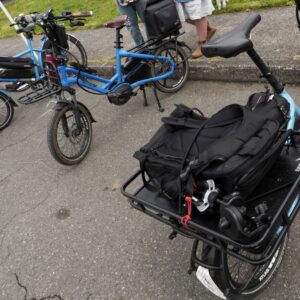Last time I checked in on the City of Portland electric bike rebate program, they told us we could expect a soft launch late summer/early fall. Well I’m happy to report they’ve kept their promise!
In a major update to this long-awaited program, the City has come up with a name for the program — “Portland Rides” — launched a new website and a soft launch of the program is set to begin officially this coming Monday, September 29th when the application period for the first batch of rebates begins.
To refresh your memory, the e-bike rebate program was adopted by City Council as part of the Clean Energy Community Benefits Fund’s (PCEF) Capital Investment Plan in June 2024. The plan is to use $20 million from that fund (which comes from a tax on large corporations) to support an estimated 6,000 new e-bike purchases over the next five years. In addition to helping Portlanders afford these new vehicles, the program will train 50 mechanics and invest in infrastructure for charging and bike parking at multi-family apartment buildings.
According to the City of Portland, the soft launch will target Portland Community College students who will be eligible for a $1,900 rebate. The rebate is split between $1,600 off a “standard Class 1 e-bike” and $300 for “essential bike accessories” (helmet, lock, lights, and so on). The window for rebate applications opens Monday September 29th and closes October 15th. A total of 250-300 rebates will be made available during the soft launch.
Rebates will be redeemable from participating bike shops that are required to have a brick-and-mortar presence in Portland and provide both sales and repair service.
I also learned today that the City of Portland has awarded the contract to administer the program to Resource Innovations, a “women-led, purpose built” firm that, “provides consulting and program management for the energy sector, helping utilities, government agencies, and system operators to achieve decarbonization goals and improve energy equity through services like clean energy transition, grid modernization, and electric vehicle integration.” The company that will process applications and rebates is APTIM, an environmental consulting firm. Portland State University will be the program’s third-party evaluator.
The full program that will be open to all qualifying Portland residents is set to launch in March 2026.







Thanks for reading.
BikePortland has served this community with independent community journalism since 2005. We rely on subscriptions from readers like you to survive. Your financial support is vital in keeping this valuable resource alive and well.
Please subscribe today to strengthen and expand our work.
So cool!! How will they go about training mechanics? Do you know if there is an application for that?
Crikey, the PCEF slush fund’s off the leash again — and this time it’s chucking e-bikes at uni students like Oprah on a sugar high. “You get a bike! And you get a bike!”
They’ve slapped a shiny new logo on it and called it “Portland Rides” — which sounds more like a dodgy rideshare app or the name of a midlife crisis tattoo shop than a serious city program. But hey, branding is half the battle when you’re throwing $20 million of corporate guilt money around, right?
So what’s the master plan? Hand $1,900 in “rebates” to students (who may or may not ride anything other than a Lime scooter), cross fingers they don’t flog the bikes for cash, and hope the whole thing doesn’t turn into Portland’s version of Facebook Marketplace’s hottest resale category.
And just to keep things spicy, they’ve tapped yet another untested “women-led, purpose-built” nonprofit to run the show — because nothing says “fiscal responsibility” like handing the wheel to an outfit no one’s ever heard of with a mission statement longer than a Bunnings receipt.
Of course, there’s a third-party evaluator (cheers, PSU) — because when your scheme’s likely to go pear-shaped, best to pay someone to tell you it’s going great. Bit like hiring your mate to judge your pub trivia night.
Meanwhile, the actual shops doing the grunt work — you know, selling and fixing bikes — just have to smile, nod, and hope the city doesn’t stuff up the rebate paperwork like it’s a Centrelink form.
All up, it’s a classic Portland special: overfunded, under-thought, full of buzzwords and destined for a colourful write-up in some future auditor’s report
So what would you propose as an alternative, exactly?
I would prefer to see a local tax rebate for any bike purchase. It would be significantly cheaper to administer. If you add up the numbers noted above, it looks like this program for 6,000 e-bikes is going to have huge overhead costs.
The mooching upper-class already receives far too much free money from the government.
Every cent of this should go to low-income people.
Via what programs?
Sigh.
The program we are actually discussing here was explicitly designed to be means-tested (because very limited funding is available):
https://www.portland.gov/bps/cleanenergy/climate-investment/events/2024/6/26/city-council-meeting-pcef-strategic-program-6
PS: I would have liked this to be an adequately-funded universal program so don’t you dare @ me about universal vs means testing.
Weird deflection from the question. What programs do the upper class use to mooch off the government?
Portland’s “rich” (the ones who haven’t left yet) pay for our failing universal preschool program, our many boondoggles for the houseless, and Portland’s various business taxes, including the one juicing this particular slush fund.
In return, the city’s remaining working “rich” enjoy terrific schools and a peaceful downtown. /s
I see nothing about the $1,900 rebate above being means-tested. Is it? This initial rollout is only open to PCC students, who may or may not be from wealthy families. I knew several PCC students who were from wealthy families.
An alternative to what?
Okay but budget cuts everywhere right? HOW are they supposed to justify cutting programs when the money is still there?
Yeah I’m sure the local bike shops are going to be really bummed with the paperwork to get thousands of new bikes sold.
The worry about reselling is misplaced. Even if it happened (and I don’t expect it), they have to resell at used bike prices. I.e. a heavy discount. But again, I doubt it’ll really happen, and there will be follow-up surveys I think.
Funny how mad you are about that nonprofit being women led. Says more about you than anything else I think.
Ah, the old “They’ll just sell the bikes for cash” argument again. This comes up at EVERY e-bike rebate program launch. Has it actually happened? Do you make the same argument for car rebate programs? I remember you calling this a “tax on the employed” in a previous story.
Shawne, Let’s not lose sight of something more pressing: the PCEF tax is a regressive tax that hits low-income folks hardest. While it was sold to voters as a tax on big corporations, those costs are passed on to consumers, particularly in stores like Winco, Fred Meyer, and Safeway, where low-income shoppers are most likely to shop. This tax raises prices on everyday goods, and it’s people with limited budgets who end up paying the price.
As for the concern about flipping bikes for cash—it’s a valid concern. With massive subsidies like these, the incentive to exploit the system is significant, and it’s not unreasonable to expect that some people will try to resell bikes for cash, undermining the program’s goals.
And here’s the kicker: Portland is facing a massive $11 million budget deficit, struggling to provide basic municipal services. Yet, it can still blow money on subsidies like this? At a time when the city can’t even fund public safety, bike lane maintenance, or homeless services adequately, PCEF needs to go back to the voters. The reality is that it’s not sustainable when the city is already stretched thin.
Ultimately, while the stated goal of these programs is to promote cleaner transportation, we can’t overlook the PCEF tax’s impact. It’s a regressive burden on people already struggling to get by, making everyday goods more expensive. If we’re going to spend this kind of money, let’s make sure it’s sustainable and truly benefits everyone, not just make the wealthier and more privileged feel good about “progress”.
Even more of a reason to not have a single cent of PCEF revenue go to upper class moochers.
Are PSU students upper class? The PSU students I’m acquainted with are part time in the service industry, unsupported by their parents. One was living out of a backpack.
Can’t miss an opportunity to attack the rich, even if it’s completely unfounded.
As someone who benefits from absurd tax break after absurd tax break and who would like to see people like me and you taxed at far higher-levels, I think criticism of the oh-so-thin-skinned and privileged rich is very much merited.
So, don’t benefit from them, you can send the government however much money you want, think how morally superior and nauseating you’ll be then.
I want the government to keep more of your and Chris I’s tax dollars too — and for that we need systemic change, not just a single random act of charity.
What impact has the PCEF tax had on consumer costs? Are prices at Winco, Fred Meyer, and Safeway stores different on different sides of Portland’s boundaries?
Good point, because if I ran one of these companies, I would certainly opt to increase my administrative burden to identify exactly which stores should have their prices go up inside a specific geography, I’d never just increase prices on an entire region of people who apparently don’t think that all these “little” taxes add up at all in any meaningful way to impact the cost of employment, benefits, operations, etc.
Not sure how it has impacted those stores, but I know that Wal Mart and REI definitely changed their prices after PCEF was implemented.
People were actually doing that for a time during the COVID years, when rebates were big on EVs and Teslas and certain rare EV brands were holding their value on the used market. That, of course, is no longer a thing, as used EV prices have absolutely tanked.
I think the issue here is that a $1,600 rebate on a “Class 1” ebike is going to pay for just about the entire cost on a mid-range class 1 model. Compared to the EV rebates we had on cars, which were less than 25% of the purchase price, this leaves a lot more room for bad actors to play.
The bikes aren’t free and the students aren’t stupid. When a bikes is resold, the lucky student get still get a bunch of cash—just way less than Portland’s beleaguered taxpayers paid to buy it and to administer this program.
More info on the firm here. They appear to be based out of Chicago:
https://www.resource-innovations.com/about-us/leadership
Lots of good stock photos.
Thanks for the link. Seems like a strange choice of a firm to run a rebate program. And to those who posted about being a non-profit, no there not. So part of the 20 million will be paying there fee. To me it should be administered by a local (Portland) group of accountants and bookkeepers.
That equates to about $3,300 per new e-bike, but the end user monetary subsidy is just $1,900. I think we need more clarity on the cost to train the mechanics and how much infrastructure they are adding. It seems like a lot of overhead here.
Love it. I already have a very nice e-bike but the more people that ride them the better. They really are life changing.
I for one will be looking forward to the rigorous data I hope PCEF will be gathering, showing whether this is (or is not) an effective way to lower emissions. Which is, as a reminder, the fundamental reason PCEF exists (as opposed to achieving other unrelated social goals).
If folks using this rebate drive $3300-worth-of-emissions less, it might be a good thing. But if it primarily displaces people from the bus, then we’re wasting our emissions-cutting funds.
Ebikes are a net carbon negative when used instead of transit that would run anyway, regular bike, or walking — i.e. the most common forms of transport for students (and the only kind many of them use). You only really come out ahead when they replace driving.
For purposes here, carbon offsets in projects like this provide a useful point of reference — roughly $10 can be thought of as the amount it should cost to offset a metric ton of CO2.
The EPA estimates that a “typical” car that makes 22mpg and driven 11,500 miles per year emits 4.6 metric tons of CO2 which can be thought of as 0.4kg of CO2 per mile with the offset being worth about $0.01 per kg which means a dollar should have the impact of reducing 250 miles of driving.
So if each ebike on average helps offset 825,000 miles of driving (almost 5 billion miles for 6000 bikes), this is a solid project. Unfortunately, this outcome seems improbable. More likely, it will be a total waste even by Portland standards which is too bad considering how many truly worthwhile things can’t get funding.
Thank you for doing the math. I was going to sit down and do it this weekend, but you saved me the trouble.
I strongly supported PCEF and it’s original goals. I am very unhappy with what it has become.
I thought the reason people don’t ride bikes is supposedly because of the infrastructure.
If that’s really the case, you’d think putting that money into infrastructure or making transit more useful/available would be more helpful than giving one of the physically most able demographics electrical assistance for short hops.
I’m guessing we see some really good deals on lightly used ebikes
I have a slightly different take. The people who are able to deal with riding a bike in car traffic on surface streets aren’t a particular demographic, they are physically gifted (of whatever age) or else possessed with the idea that bikes are sensible, and damn the torpedos.
E bikes put every person in the gifted class that I’ve assumed you enjoy, so that they can often match speeds in a variety of traffic situations, or at least reduce the speed differential that increases the perception of danger on the road. If nothing else, an ebike rider doesn’t have to deal with a level of fatigue that takes the fun out of an hour or so of street riding (street riding being more demanding and less fulfilling than a similar time or distance on the open road).
I doubt that many people will jump through hoops to get an ebike so they can resell it. For most people, selling a used bike is a just a pain and they’ll leave it in the basement or the yard for years. I wouldn’t be surprised to find out that there are 100,000 roadable bikes in Portland that haven’t been out for a year or more.
“they’ll leave it in the basement or the yard for years.”
From a climate perspective, we’d be better off of they resold it.
Ebikes do help people move more easily. But prioritizing a much younger (and presumably stronger) group in a relatively flat area of town who have less distance to cover is silly even by Portland standards.
People might not normally wouldn’t jump through many hoops just to resell something, but $1900 leaves a lot of room to make a huge profit for very little effort.
Which bike shops are participating in this program?
Hi Jonathan, Resource Innovations is a private, for-profit company with venture capital investment; they are NOT a non-profit. I think some of their ownership includes Morgan Stanley. They bought a medium-sized consulting firm based in Portland in 2024 called Cadeo. They do have a woman CEO. I hope for the city’s sake they can pull this off. Thanks for the update.
Hi Emily, Thanks. I’m aware of that. Shortly after posting this I heard from the city with the correction and edited the story immediately.
Yes, hopefully this works. That woman needs a new vacation condo.
Curious what high quality (Bosch/Specialized mid-drive) bikes will work with the program. The limitation to class 1 points towards Cargo Line motors, and not the class 3 motors fitted to the usual crop of name-brand eMTB, and E-hybrids.
Should be good for the Tern dealers, as most of them are Class 1, ya? And I guess the Shimano bikes from Kona should be ok.
Kinda a bummer that this won’t work for the great specialized bikes.
My larger concern is that this rebate ends up with a flood of crappy, disposable, hub drive bafang bikes which folks use and then drop once they inevitably fail in 12-24 months.
The best selling Terns are all “cargo” bikes so they do not qualify for the soft launch program. Class 1 bikes are generally not crappy hub drive – by definition, they are pedal-elec, so no throttle, and with mid-drive.
Limiting these to Class 1 is just about the only intelligent part of this plan. That cuts out the majority of the garbage and will hopefully only attract users who actually want to ride a bike.
I am a low income women, 42, and am in need of an ebike. An ebike would change my commute to work. Can I apply now? Or do I need to be actively enrolled into college (which I am not) I am just working.
Where is the application form? How do I confirm I get the rebate?
This would really change things for me but I am confused about how to apply and how to take advantage of this program. Is there someone who can explain to me the process?
Any information would be appreciated.
Will the program use the same AMI thresholds when it opens for everyone?